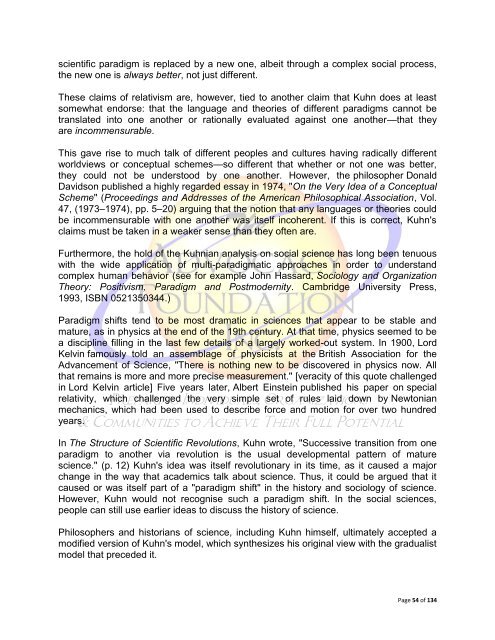Cultural Transformation
Cultural Transformation
Cultural Transformation
Create successful ePaper yourself
Turn your PDF publications into a flip-book with our unique Google optimized e-Paper software.
scientific paradigm is replaced by a new one, albeit through a complex social process,<br />
the new one is always better, not just different.<br />
These claims of relativism are, however, tied to another claim that Kuhn does at least<br />
somewhat endorse: that the language and theories of different paradigms cannot be<br />
translated into one another or rationally evaluated against one another—that they<br />
are incommensurable.<br />
This gave rise to much talk of different peoples and cultures having radically different<br />
worldviews or conceptual schemes—so different that whether or not one was better,<br />
they could not be understood by one another. However, the philosopher Donald<br />
Davidson published a highly regarded essay in 1974, "On the Very Idea of a Conceptual<br />
Scheme" (Proceedings and Addresses of the American Philosophical Association, Vol.<br />
47, (1973–1974), pp. 5–20) arguing that the notion that any languages or theories could<br />
be incommensurable with one another was itself incoherent. If this is correct, Kuhn's<br />
claims must be taken in a weaker sense than they often are.<br />
Furthermore, the hold of the Kuhnian analysis on social science has long been tenuous<br />
with the wide application of multi-paradigmatic approaches in order to understand<br />
complex human behavior (see for example John Hassard, Sociology and Organization<br />
Theory: Positivism, Paradigm and Postmodernity. Cambridge University Press,<br />
1993, ISBN 0521350344.)<br />
Paradigm shifts tend to be most dramatic in sciences that appear to be stable and<br />
mature, as in physics at the end of the 19th century. At that time, physics seemed to be<br />
a discipline filling in the last few details of a largely worked-out system. In 1900, Lord<br />
Kelvin famously told an assemblage of physicists at the British Association for the<br />
Advancement of Science, "There is nothing new to be discovered in physics now. All<br />
that remains is more and more precise measurement." [veracity of this quote challenged<br />
in Lord Kelvin article] Five years later, Albert Einstein published his paper on special<br />
relativity, which challenged the very simple set of rules laid down by Newtonian<br />
mechanics, which had been used to describe force and motion for over two hundred<br />
years.<br />
In The Structure of Scientific Revolutions, Kuhn wrote, "Successive transition from one<br />
paradigm to another via revolution is the usual developmental pattern of mature<br />
science." (p. 12) Kuhn's idea was itself revolutionary in its time, as it caused a major<br />
change in the way that academics talk about science. Thus, it could be argued that it<br />
caused or was itself part of a "paradigm shift" in the history and sociology of science.<br />
However, Kuhn would not recognise such a paradigm shift. In the social sciences,<br />
people can still use earlier ideas to discuss the history of science.<br />
Philosophers and historians of science, including Kuhn himself, ultimately accepted a<br />
modified version of Kuhn's model, which synthesizes his original view with the gradualist<br />
model that preceded it.<br />
Page 54 of 134

















